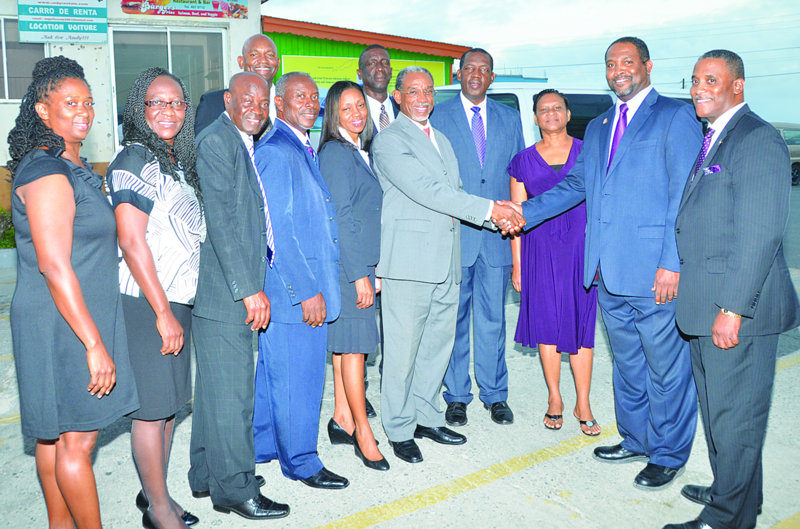
The initial period of six months during which the Eastern Caribbean Central Bank took over the operations of the National Bank of Anguilla and the Caribbean Commercial Bank, is coming to a close at the end of this month.
Ahead of that date, however, a public meeting was held on Monday evening, at the Auditorium of the Orealia Kelly Primary, School at which a number of shareholders were urged to take action to protect and preserve the two indigenous banks – and to plan the way forward for both institutions.
The meeting was called by Mr Kennedy Hodge, who described himself as one of the co-founders of the National Bank, and of which he is a major shareholder as well. He is also part of a family corporation which has shares in the Caribbean Commercial Bank. “I am an Anguillian and I have an interest in both banks being strong and healthy and serving Anguilla,” he told those at the meeting. He stressed that the meeting was “not to attack anyone, and was not political” – and that the facts associated with the position of the banks were “impacting everyone equally.”
He went on: “The meeting is about letting the Anguillian public, and the shareholders of both CCB and NBA, know what we face in the current situation. It is about encouraging the exercise of our democratic and constitutional rights to preserve and protect what we have built without destabilising what we are trying to protect and rebuild. It is about exhorting us to wake up out of our malaise and save ourselves. It is about reminding us that we cannot simply lie down and rely on others to save us and what we have taken our time and effort to build over the years. It is about standing up and making it crystal clear to others that we will not have our own goals and objectives – our own wishes and dreams – ignored and other people’s imposed upon us… It is about reenergising ourselves to fight the challenges facing Anguilla, and our banks, and never giving up until we have won.”
Mr Hodge examined in detail, and in a balanced manner, the problems faced by NBA which led to the intervention of the Central Bank and which could have been avoided. He felt free to refer to those issues as the bank is a public company; but he was less inclined to speak about the business of CCB which is a private company. He said, however, that both banks were taken over by the ECCB because, in its opinion, they fell below regulatorily mandated minimum capital ratios; they suffered damage from unfair loan packages by international banks; and there was fear that what would happen to one indigenous bank in Anguilla would impact the rest of the indigenous banks in the ECCB area. He complained that since the ECCB takeover of the banks there had been a lack of information about the situation.
Mr Hodge, who was the only presenter, dealt with various matters affecting the banks in his almost two-hour passionate presentation. One of the issues on which he spoke to a large extent, was the possibility that a decision could be taken by the ECCB to amalgamate the banks. He expressed opposition to the merging of the two banks or their merger with other banks in the region. He was of the view that there was a need for the people of Anguilla to be an important part of the decision-making process in relation to resolving the problems of the two banks, including the bad debts amounting to some five hundred million EC dollars.
He called for Anguillians to play the leading role in the establishment of a Resolution Trust Corporation (RTC) to deal with the bad loans at the banks. He explained that an RTC which might be better known to Anguillians by its US designation TARP, is the process used world-wide to address excessive bad loans in the banking system. The RTC purchases the bad loans, thus giving the banks back the money they lent out and restoring the banks’ liquidity and capital so they can continue doing business as normal. The RTC then structures repayment plans with the defaulted borrowers on more concessionary terms such as longer repayment periods and lower interest rates that the banks are not able or might not be permitted to provide.
Mr Hodge also called for the appointment of a committee to bring these demands to the Chief Minister and Minister of Finance and Anguilla’s Governor as well as the Central Bank Governor. He emphasised that there was a need to make it clear to all and sundry that an imposed solution with respect to NBA and CCB would not be accepted by the people of Anguilla.








